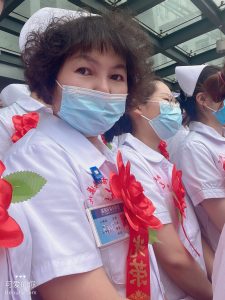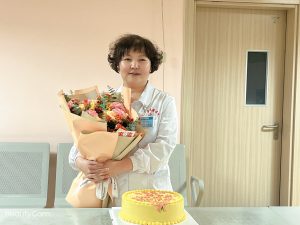8 China, Xiangyun Peng
China
China is a populous country located in Eastern Asia. Healthcare in China is a mix of Western and Eastern. There are traditional Chinese medicine hospitals as well as Western medicine hospitals.
 My name is Xiangyun Peng and I am a Nurse Manager on an Obstetrical Unit in Kunming China.
My name is Xiangyun Peng and I am a Nurse Manager on an Obstetrical Unit in Kunming China.
Daily Activities Working with Families
My daily activities working with families include delegating and creating work assignments, managing funding, billing patients, helping other nurses: check vaginal bleeding, medications, check newborn information, assessments, vaccines, baths.
Shifting Family Nursing Practice
Because everyone had to support COVID a lot of staff were pulled from our unit to go support to COVID efforts elsewhere. Once you were pulled by the government you did not have a choice you must go support areas where COVID was worse. Sometimes this would mean nurses would be gone for a month from the hospital and their families and sent to areas outside of the province. Because of the risk of being pulled to support areas of COVID outbreak, we weren’t allowed to leave our area of Kunming. This posed a challenge for people whose parents and extended family were not in Kunming because they were unable to leave and visit them. If you were pulled, you would be notified and given 1-2 hours to get to the hospital and then you would be sent to places that needed help. The worst short staffing our unit had was 4 nurses gone which caused significant stress on the nurses left to pick up their work. Almost every week we had nurses being pulled elsewhere. This resulted in stressors on our hospital staff because a two-person job suddenly turned into a one person job. For younger staff, many were only able to take one day off during the week. The usual hours worked per week is 40 hours but with short staff many nurses including myself stayed until past the end of their shift. For me personally, when it was busy I stepped out of my administration role to help other nurses.
During the height of the pandemic moms had to test negative to come to the unit and visitation rules on the unit were one visitor who had to do a covid test every 3 days. This one designated visitor for whole the entire hospital stay. This caused anxiety and stress among patients and families. Since it was usually the husband chosen to be the designated visitor, a lot of new moms and dads lacked information and could not rely on the knowledge of their parents. Compared to western culture families in China are very connected between generations. It is common for grandparents to take care of their grandchildren and educate the new parents about parenting. In many cases, the dad would be tired because it the usual for parents in China is to have heavy support from the grandparents. This would cause the couple to want to change the designated visitor but it was hospital policy and there was nothing we could do. Patients would also argue with us about having to do COVID tests and the inability for more family members to come in. Patient’s could use their personal technology, our hospital did not have free Wi-Fi but they could use their own devices and data.
Lessons Learned
Team spirit and collaboration were apparent during the peak of the pandemic. When nurses were pulled, other nurses would pick up their work, if patients were viscously arguing multiple nurses would stand together, and even if a nurse had finished their work for the day you would never see a nurse standing there and doing nothing, they would always go help out other staff.
In Mandarin:
昆明中国
职称 主管护师 种植
名字 彭祥云
日常活动 与家人一起工作
我与家人一起工作的日常活动包括委派和创建工作任务、管理资金、向患者开具账单、帮助其他护士:检查阴道出血、药物、检查新生儿信息、评估、疫苗、给新生洗澡。
转变家庭护理实践
因为每个人都必须支持疫情防控,所以我们部门的很多员工都被抽到其他地方支持抗疫工作。 一旦你被政府抽调走,你就别无选择,必须去支持新冠疫情最严重的地区。 有时,这意味着护士将离开医院和家人一个月,并被送往省外地区。 由于存在被调去支援新冠肺炎疫情地区的风险,我们不被允许离开昆明地区。 这对那些父母和家庭不在昆明的人来说是一个挑战,因为他们无法离开昆明去探望他们。 如果你被抽调,你会收到通知,并给你1-2小时的时间去医院,然后被送到需要帮助的地方。 我们科室最严重的时候是 4 名护士离开,这给留下来继续工作的护士带来了巨大的压力。 几乎每周我们都会有护士被带到其他地方。 这给我们医院的工作人员带来了压力,因为两人的工作突然变成了一个人的工作。 对于年轻员工来说,许多人一周只能休息一天。 通常每周工作时间为 40 小时,但由于人员短缺,包括我在内的许多护士都一直待到下班。 就我个人而言,当工作繁忙时,我会脱离行政工作去帮助其他护士。
在疫情最严重的时期,准妈妈们必须进行阴性检测才能来到病房。病房的探视规则是访客必须每三天进行一次核酸检测。同时整个住院期间只能有一位指定的访客。 这给患者和家属带来了焦虑和压力。 由于通常是丈夫被选为指定访客,因此许多新妈妈和爸爸缺乏经验,又无法依赖父母的知识。 与西方文化相比,中国家庭联系非常紧密,祖父母照顾孙子并传授新父母有关育儿的知识是很常见的。 很多时候,爸爸会很累,因为中国的父母通常需要祖父母的大力支持。 这会导致新父母想要更改指定的访客,可是这是医院的政策,我们无能为力。 患者还会与我们争论必须进行新冠病毒检测以及无法让更多家庭成员进来。我们医院没有免费的 Wi-Fi,但他们可以使用自己的手机和流量。
经验教训
在疫情高峰期间,团队精神和协作是显而易见的。 当部分护士被抽调到其他地方的时候,留下的护士就要接手他们的工作。如果病人激烈争吵,很多护士就会团结在一起。即使一个护士完成了当天的工作,你也不会看到一个护士站在那里无所事事,他们会 总是去帮助其他员工。

Additional Information About Nursing in China
Nurses in China can complete different education to achieve 2 levels of nursing: 护士 (hù shì) and 护师 (hù shī). The 师 (shī) character means master, so护师 (hù shī) is a higher level than 护士 (hù shì). The years of education relates to how much experience must be accumulated to become a nurse. For example, individuals who have a bachelors degree compared to those with a technical secondary school or junior college education can achieve 护士 (hù shì) status 1 year earlier. The same applies to 护师 (hù shī). With experience 护士 (hù shì) can be promoted to 护师 (hù shī). Individuals who are 护师 (hù shī) must have 2-4 years of experience with a technical secondary school education, 1-3 years of experience with a bachelor’s degree and 1-2 years of experience with a masters degree.
Media Attributions
- Xiangyun Peng 1-1
- Xiangyun Peng 2-1
